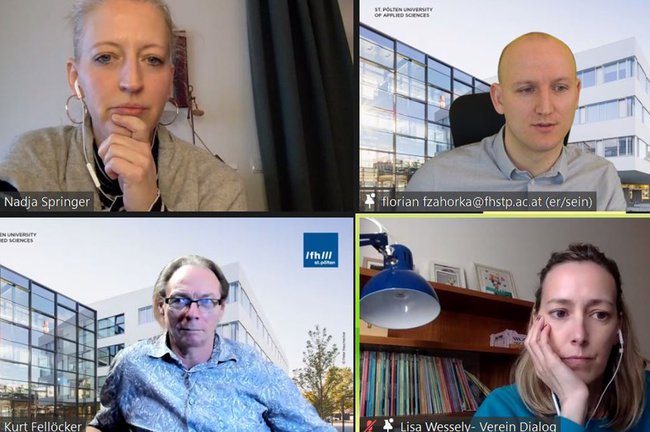Brain Doping: The Dangers of Self-Optimisation
A Report on the Symposium “Brain Doping” of the St. Pölten UAS

On 14 January 2022, the academic further education programme MSc in Addition Counselling and Prevention of the St. Pölten University of Applied Sciences hosted a symposium on the topic of “Brain Doping” – an online event made up of presentations and workshops specialising in the possibilities and dangers of self-optimisation.
Increasing Performance, Reducing Anxiety, Experiencing Spirituality
With the help of neuro-enhancement, also called “brain doping”, people strive to improve their cognitive skills or psychological well-being in a targeted manner with the goal of increasing these beyond a “normal” measure. The idea is to achieve a positive impact on or minimise certain personality traits (e.g., shyness, low self-esteem, etc.) or to compensate stress. For some people, another objective is to achieve a spiritual experience.
In 2015, the St. Pölten UAS’ academic further education programme MSc in Addition Counselling and Prevention started out with the aim of creating a better understanding of the largely unexplored phenomenon of “brain doping” (neuro-enhancement). It was this programme which organised the symposium.
From Illegal Substances to Brain-Computer Interfaces
“These attempts at performance increase and self-optimisation have come to play a role among university students, at the workplace and in the normal everyday life of people that is often underestimated. This involves not only illegal substances used to improve brain performance but also a number of drugs and food supplements, increasingly complemented by experiments with magnetic waves and, in future, brain interfaces to connect the brain to computers”, explains Kurt Fellöcker, Academic Director of the academic further education programme MSc in Addition Counselling and Prevention and organiser of the symposium.
All these attempts at doping have strong side effects and studies on their effectiveness show mixed results. “The feeling of being more capable of high performance alone says nothing about an actual increase in performance. Within the framework of the symposium, we discussed new challenges for addiction counselling and prevention that arise from this development”, says Fellöcker.
History, Practice, Research
Alfred Springer from the Faculty of Psychotherapy Science at the Sigmund Freud University Vienna held a speech on neuro-enhancement in the course of time and on psychedelic drugs used as neuro-enhancers.
Larissa Maier from the University of California sent a video message in which she outlined aspects of neuro-enhancement in an international comparison based on the Global Drug Survey.
Nadja Springer from the addiction counselling association “dialog:” presented thoughts on the concept of competence in addiction prevention and Alfred Uhl from the Faculty of Psychotherapy Science at the Sigmund Freud University Vienna showed what empirical research on the topic of neuro-enhancement has to offer.
